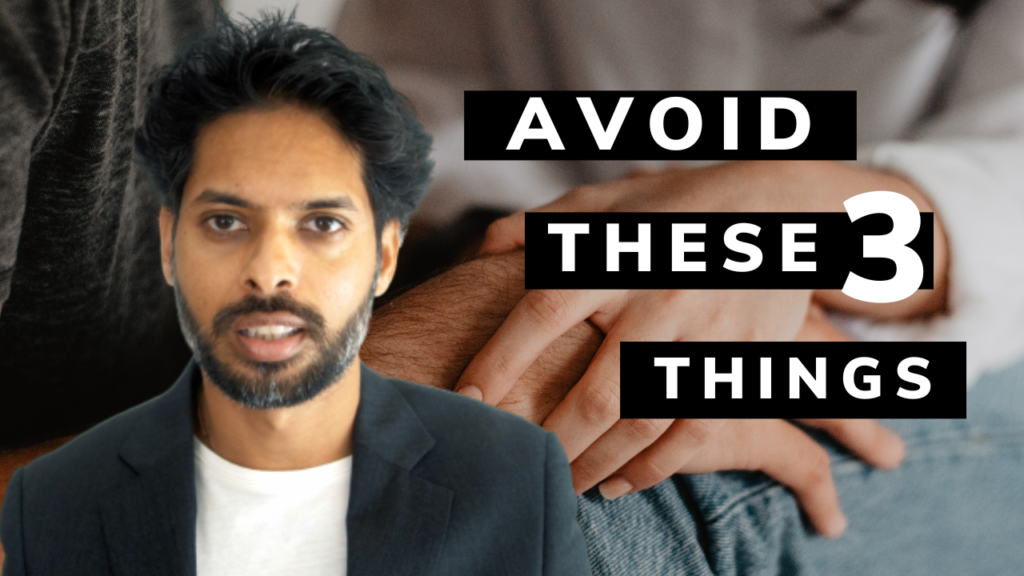Quick Guide to Supporting a Loved One with Mental Illness
The sickness of the mind is self-created. That only you can get yourself out of.
The reality is that when you take depression, anxiety, substance abuse and trauma all together – you are easily reaching 80% of the population.
In this video I’m going to talk about how to support a loved one who is mentally unwell. By the end of this video you will learn what to do and more importantly three things to avoid when providing support.
It doesn’t matter how much you love someone, taking care of them when they are going through a rough patch or recurring mental health problems can be overwhelming, exhausting and even feel like you have run out of options.
You may have encountered this in your own experience where someone puts unnecessary pressure on you when they externalise their anxiety. When you make plans with someone and they cancel last minute because they feel low on energy and those that do show up, are not present with you because in their head they are in too many places at once. When these behaviours are chronic, we call them Generalised Anxiety Disorder, Depression and ADHD respectively.
We can exercise extreme tolerance to these behaviours as they become normalised in modern social architecture however, our capacity for compassion can only stretch so far before we too experience compassion fatigue.
I want to share with you three best practices that will not only improve your capacity to provide care but will strengthen your own safety net in the process.
#1 Focus on Cognitive Hygiene
It is impossible to look after someone else if it is coming at the expanse of your own mental health. Even with the best of intentions, this is a recipe for disaster.
Take care of your self first even when it feels counter-intuitive. The sad reality is that many people find themselves in the position of a “care-taker” rather than “care-giver” because looking after someone else is a way of avoiding their own problems.
The first thing to avoid is – deriving a sense of meaning from some else’s suffering. This addiction to drama is a form of self-torture and will inevitably lead to secondary trauma.
 Make it a habit of taking care of THIS body first. A fast and easy way to do this is to create space for yourself – both physically and psychologically. Take a walk outside, spend time in a different room and treat yourself to something special. You can learn more about self compassion in this video.
Make it a habit of taking care of THIS body first. A fast and easy way to do this is to create space for yourself – both physically and psychologically. Take a walk outside, spend time in a different room and treat yourself to something special. You can learn more about self compassion in this video.
The act of simply doing something for yourself switches the context of being a carer to self-compassion. When you self-regulate, you become emotionally available. This naturally removes the emotional wall and the one you wish to support will approach you on their own.
#2 Learn to Listen
There are two important ingredients to listening that go hand-in-hand.
The first is to develop the ability to listen in the first place. This means quietening your own mind to open your heart. Listening is not about thinking about what to say next but simply to be present to what is being spoken.
 Far too often a conversation enters a reactive cycle because no-one made an attempt to listen in the first place.
Far too often a conversation enters a reactive cycle because no-one made an attempt to listen in the first place.
You might find that by simply listening, people are able to come to a resolution on their own accord without you ever having to utter a word.
This leads to the second thing to avoid which is giving unsolicited advice. The impulse to give advice is a clear example of being tone-deaf.
Once again this is counter-intuitive, as it goes against our impulse to help. However, by not engaging in the drama, you allow them to take a step back from the chaos that they fabricate in their own mind.
Listening further dissolves the emotional wall which was created by unsolicited advice perpetuating the misunderstanding that you don’t get them, don’t know what they are going through or how they feel.
#3 Delegate responsibility
We all need a helping hand from time to time but remember that it is not your responsibility to take care of someone but rather their own.
If you are providing the sole care for someone, you are not only depriving them of professional care but of them developing their own social safety net and circle of care.
When we tried to do all the things, we may have become less emotionally available and the person we are trying to support would have withdrawn from us a long time ago because we were not there for them when they needed us.
This is perhaps why the people we are closest too are the least likely to provide support because of emotional history.
 The third thing to avoid is codependency.
The third thing to avoid is codependency.
By breaking the cycle of dependency you inevitably encourage them to take responsibility for themselves. A simple way to do this is to ask them to do things for you, like picking up the groceries or fixing a squeaky door. It might feel unsafe to ask someone mentally unstable to do something yet this simple gesture gives them hope that you trust them and raises their esteem to take self-responsibility.
The Human Species is tribal by nature and we want to be there for each other. Yet this safety in numbers does not work when our sense of belonging is threatened. Simply by making it a priority to look after ourself, we bridge the distance between each other and prevent the sickness of the mind altogether.
You can learn more about how to bridge this gap through the power of love in this video.

Use My Proven Nervous System Training Trusted by Busy Executives to Eliminate Anxiety Permanently!

